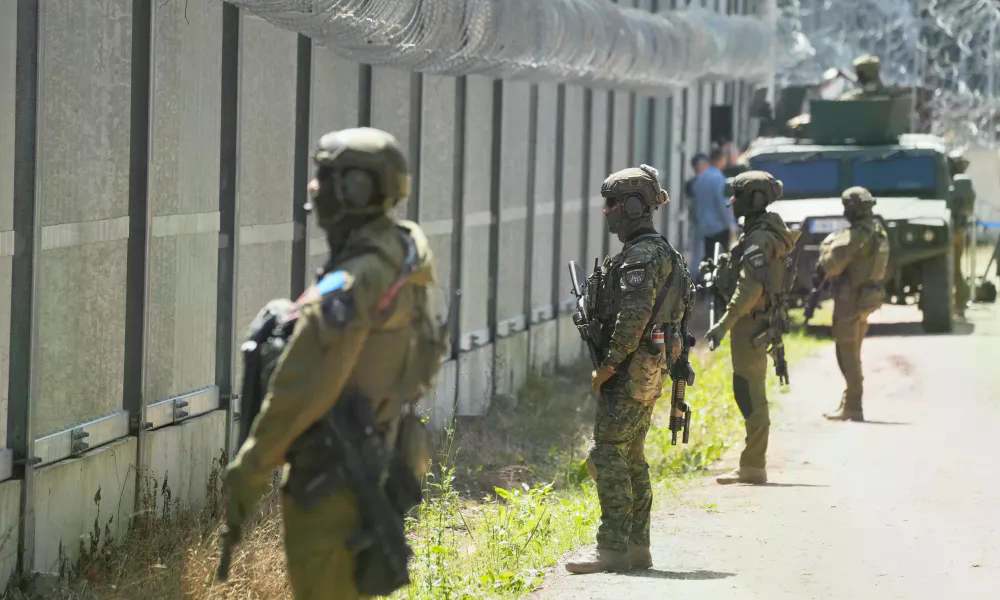‘We are scapegoats’: The rise of anti-migrant anger in Poland

A violent crime in June sparked a wave of anti-migrant sentiment in Poland. In Torun, central-north Poland, a Venezuelan man stabbed 24-year-old Klaudia, a Polish woman, to death as she was walking home from work through a park. The incident led to a silent march on July 6, where thousands of protesters, organized by supporters of the far-right Konfederacja political alliance, marched through the city carrying signs that read “stop illegal immigration.”
Following the murder, rumors and misinformation began circulating. On July 14, a Paraguayan man in Walbrzych, southwestern Poland, was reported to the police for allegedly taking pictures of children on a playground. When the police stopped him, they found no incriminating evidence on his phone. Despite this, two Polish men later attacked him. The next day, about 50 people stormed the hostel where he and other migrants lived. Some threw flares into the building, forcing the owner to close the hostel.
Anti-migrant sentiment has been growing in Poland, fueled by far-right rhetoric that claims the country is overwhelmed by “unconstrained illegal migration.” Such narratives suggest that migrants take local jobs and pose a threat to Poles, both physically and culturally. These claims are often amplified by lawmakers and political figures.
Konrad Berkowicz, an MP from Konfederacja, stated on TOK FM radio: “Xenophobia is an important element of our national unity. Condemning xenophobia and stifling it in the West has led to rapes and terrorist acts, that’s why we should cherish xenophobia.”
Elmi Abdi, a Somali refugee who arrived in Poland in 1996, expressed concern over the current climate. As head of the Good Start foundation, which supports migrants, he said: “Today, migrants are seen as responsible for all of Poland’s problems; we are scapegoats that all parties attack, even though politicians know it’s all untrue.” He emphasized that many immigrants work safely, pay taxes, and integrate into society.
The Polish Migration Forum, a rights group, has described the atmosphere in Poland as “pre-pogrom-like.” Agnieszka Kosowicz, the forum’s head, warned that violence, insults, and threats against migrants are becoming more common. She called for a decisive response from the state.
In response to rising tensions, Poland reinstated border controls with Germany and Lithuania on July 7. This followed similar restrictions imposed by Germany earlier in the year to discourage asylum seekers from entering through Poland. Poland is also monitoring the return of migrants by German authorities under EU rules, although these returns are legal.
Despite this, rumors of “illegal returns” continue to spread online, leading to the formation of unofficial, far-right patrols at the borders. These groups attempt “citizen arrests” of individuals they believe to be entering the country illegally, though they have had little success so far.
The European Union has accused Belarusian and Russian authorities of exacerbating the migration crisis by encouraging people from the Global South to travel to Belarus and then into Europe via Poland. In 2022, Poland constructed a fence along its border with Belarus to prevent irregular crossings, but this did little to stop migrants from attempting to enter. In March 2024, Poland suspended the right to claim asylum altogether, aiming to deter further arrivals.
These policies have contributed to heightened anti-migrant fear in Poland, which far-right groups have exploited for political gain. The situation escalated nearly two weeks ago when anti-migrant marches organized by Konfederacja and football fans took place in 80 Polish towns and cities. Participants chanted racist slurs and slogans, expressing concerns about security and national identity.
Sixteen-year-old Nikola, who traveled from Gorlice to attend a march in Krakow, cited online videos claiming that Western Europeans are “afraid to leave their homes” due to undocumented immigrants. She emphasized the importance of joining a movement that unites Poles around the issue of security.
At the event, participants included many wearing Polish patriotic clothing and football emblems. They passed tourists filming the protests, while some elderly women waved Polish flags. Danuta, a 60-year-old protester, claimed the nation was “living under terror” and called for civilian involvement in defending the borders.
On Market Square, the march intersected with a smaller counterdemonstration by left-wing groups, resulting in exchanges of insults. While the police reported no major incidents, Abdi and other migrants interviewed by Al Jazeera said they avoided leaving their homes due to fear.
Experts point to misinformation as a key driver of anti-migrant sentiment in Poland. Kosowicz noted that the number of irregular migrants entering the country does not reflect the exaggerated narratives. Under the Dublin procedure, Germany returns people who claimed asylum in Poland before crossing into Germany. In 2024, only 318 such cases were recorded, a relatively small number.
According to the OECD, 2.2 percent of Poland’s population was foreign-born in 2023, significantly lower than in countries like the UK (15.4 percent), Germany (18.2 percent), and France (13.8 percent). In 2022, 152,000 immigrants obtained long-term residence permits in Poland.
At the Polish-Belarusian border, which has been used by migrants from the Global South since 2021, the numbers have not been particularly high. From January to late June 2024, 15,022 attempts to cross illegally were recorded, with only 5 percent successful. In 2024, there were nearly 30,000 attempts, with one-third successful, compared to 52,000 in 2021 before the construction of the border fence.
Kosowicz criticized the government for failing to educate the public on the benefits of migration. A Deloitte and UNHCR study found that 2.7 percent of Polish GDP comes from the work of Ukrainian refugees. However, such information is rarely highlighted by politicians.
Abdi, married to a Polish woman and father of two children, expressed deep concern for their future. “When I arrived here, the Poles welcomed me wonderfully,” he said. “I care deeply about Poland; it’s my home. I want it to be safe for everyone.” He added, “At the marches, people shout that they want a white Poland. I’m old enough, I’m not afraid of anything. But I am worried about my children.”


